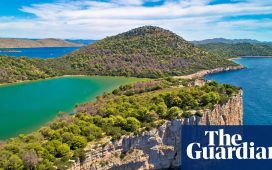As the sun sets, a perplexing array of sounds waft over the gently sloping meadow of our campsite. As well as the chaffinch’s call, there’s a curious tap-tap-tapping; beyond, a bird with a sore throat is imitating a donkey; then there’s a hoot, a laugh and a furious chattering argument.
After two nights, we identify the noises. The tap-tapping is wild red squirrels, which open wooden feeders on the old oaks around us. The “donkey” is a white-naped crane, the hoot is a howler monkey, and the arguments are between the lemurs that curl their tails around the trees just beyond our tent.

When we (my wife Lisa, twins Milly and Esme, 7, and Ted, 5) arrive at Durrell Wildlife Camp, a glamping site based right beside the lush parkland of Jersey Zoo, we are warned that lemurs will wake us every morning. They don’t: we sleep incredibly soundly, spellbound by intense days spent unusually close to other animals and calm evenings sleeping together beside the woodburner inside our yurt.
A zoo holiday is an easy sell to my wildlife-loving children. But, to be honest, I’d visited Jersey once before and wasn’t a fan. There’s its reputation for rich tax exiles, while its maze of lanes – like spaghetti, according to one local – seemed claustrophobic. I’m ambivalent about zoos, too, and don’t believe that large, roaming animals, such as elephants, should be kept in such small spaces.
But I was wrong about Jersey, and its zoo does exactly what Gerald Durrell declared it must when he founded it 60 years ago: it is dedicated to “saving species from extinction”.
Unexpectedly, the island’s west coast feels like Australia, with its thundering surf, glittering light and vast beaches, and is home to unspoiled coves such as Beau Port and Portelet Bay. On the more desolate north coast, I spy the acrobatic choughs – the beautiful “sea crows” which vanished from the Channel Islands a century ago but have been reintroduced by the Durrell Wildlife Conservation Trust, the charity that co-ordinates Jersey Zoo’s captive-breeding work to support endangered species around the world.

When we arrive at the zoo, it immediately feels homely, perhaps because it still is a home, and there’s a sense that the staff are a close-knit family. Gerald Durrell died in 1995 but his widow, Lee, still lives here, alongside other conservationists working for Durrell’s charity. Durrell is remembered for his jolly stories but he was also a conservation visionary who revolutionised the western concept of a zoo, demanding that they become arks for wildlife.
His legacy is visible on our first evening, when we watch some of the young scientists studying in the zoo’s conservation academy enjoying a kick-about on the grass outside the campsite. Durrell’s academy has trained more than 4,000 conservationists from 141 countries (and I can confirm that Brazilian conservation scientists possess the best footballing skills).

These young conservationists are as chatty and idealistic as zoo employee Will Highfield, who takes us on a dusk tour (a perk of zoo camp life) after the day visitors have departed. Will worked in financial services – as do many young Jersey islanders – before volunteering and then taking a job at the zoo. Later this year he is running a marathon in a gorilla suit to raise money for gorilla conservation.
Having this garden-like zoo to ourselves at a time of day when many animals, such as the amazing fruit bats, become more active, is magical. Most western zoos now have “enriched” habitats with plenty of natural vegetation, but Jersey’s enclosures are particularly generous. Tamarin monkeys live uncaged in natural woodland. Lemurs climb high in ancient oaks and sycamores. And there’s also a preponderance of what Durrell called “little brown jobs”. He believed we were as much obliged to save from extinction the mountain chicken (a large, shy and rather plain-looking frog) and the (actually quite grey) pink pigeon as we are lions and tigers. And so his zoo continues to breed the two former species for conservation programmes, and doesn’t keep the latter.

Staying at the campsite gives us free access to the zoo, and we easily fill three days there. This solves the sensory overload problem posed by a day trip, when children rush from animal to animal without experiencing any true connection with another species. As they keep returning, my children slow down, and develop relationships with their favourite animals. We book in for extra “experiences” – meeting lemurs and feeding meerkats, otters and orangutans. Meeting the orangutans is a particularly emotional encounter: our endangered near-relatives most sharply prick our consciences about the extinction crisis.
I’m struck by how this zoo holiday helps fulfil what US naturalist EO Wilson called biophilia – our craving for a deep connection with other species. Milly adores feeding camellia flowers to the lemurs, Ted loves the jewel-like blue poison frogs and, in the butterfly house, Esme is as authoritative as a miniature keeper, licking her finger and expertly tempting butterflies on to it, feeling that joy that comes from bonding with another member of our amazing planet.
• The trip was provided by the Durrell Wildlife Camp at Jersey Zoo. A three-night stay for a family of four costs from £480 (extra tipis available for older children for £30 a night), including unlimited entry to the zoo. Dusk tours exclusive to camp guests are £15 adult, £5 child (under-4s free). Additional wildlife experiences include meerkat and otter encounters (£50), meet the lemurs (£100) and meet the apes (£100)
Looking for a holiday with a difference? Browse Guardian Holidays to see a range of fantastic trips













